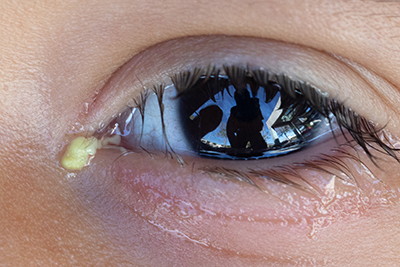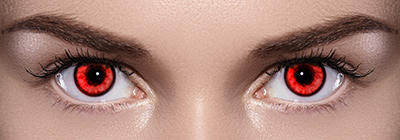Cosmetic contact lenses change your eye color or appearance, helping you make a subtle or bold statement with your eyes. But beware: buying cosmetic contact lenses not prescribed by an eye doctor who has examined your eyes can lead to serious eye problems—even vision loss.
Contact lenses require a prescription from a licensed eye care practitioner. They are deemed medical devices by the U.S. Food and Drug Administration (FDA). Contact lenses are banned from being sold by non-licensed vendors, including gas stations, convenience stores and beauty parlors. It is illegal to import and sell counterfeit contact lenses into the U.S., and federal law enforcement agencies work to stop this from happening. The simple fact is that unregulated cosmetic contacts are bad news for your eyes.
Here are four ways that over-the-counter decorative contact lenses can hurt your eyes.
Poorly fitting contact lenses can scratch your eye and cause painful sores

When over-the-counter lenses are not fitted and sized properly for your eyes, the lenses can scratch the outer layer of the eye. This causes a painful
corneal abrasion. You may find your eyes are sore, red and sensitive to light. You may also see discharge in your eye, or feel like something is stuck in your eye.
A corneal abrasion can also lead to a
corneal ulcer. Corneal ulcers may appear as a white dot on the iris, the colored part of the eye. Corneal ulcers usually need to be treated with medicated eye drops. When an ulcer heals, it can scar over and permanently affect your vision. In some cases, the cornea can be so damaged that a
corneal transplant is needed to restore vision.
Non-prescription contacts can lead to severe eye infection

Bacteria, viruses and amoebas are dangerous organisms when they affect your eyes. If your costume contact lenses cause corneal abrasions and eye ulcers, your eyes are more vulnerable to serious
eye infections called
keratitis. A 2011 study found that people who wore decorative contact lenses were 16 times more likely to get keratitis than people who wore regular contact lenses!
Some infections, such as
herpes simplex, can keep coming back and can be difficult to treat. Also, a number of bacteria have become resistant to common antibiotic eye drops.
Cosmetic tinted contacts may be toxic to your eyes

A study found that
the chemicals used to color over-the-counter tinted contact lenses include chlorine and other harmful substances. These chemicals, known to be toxic to human tissue, can seep into your eye, possibly leading to vision loss.
Complications from decorative contact lenses can lead to other eye diseases

If you suffer severe, ongoing problems from non-prescribed contact lenses, you are at risk for developing other vision-limiting diseases, including
cataract and secondary
glaucoma. You may need eye surgery to restore your vision or to try to save your remaining sight.
Real People, Real Problems with Colored Contact Lenses
Facts About Colored Contacts and Costume Safety